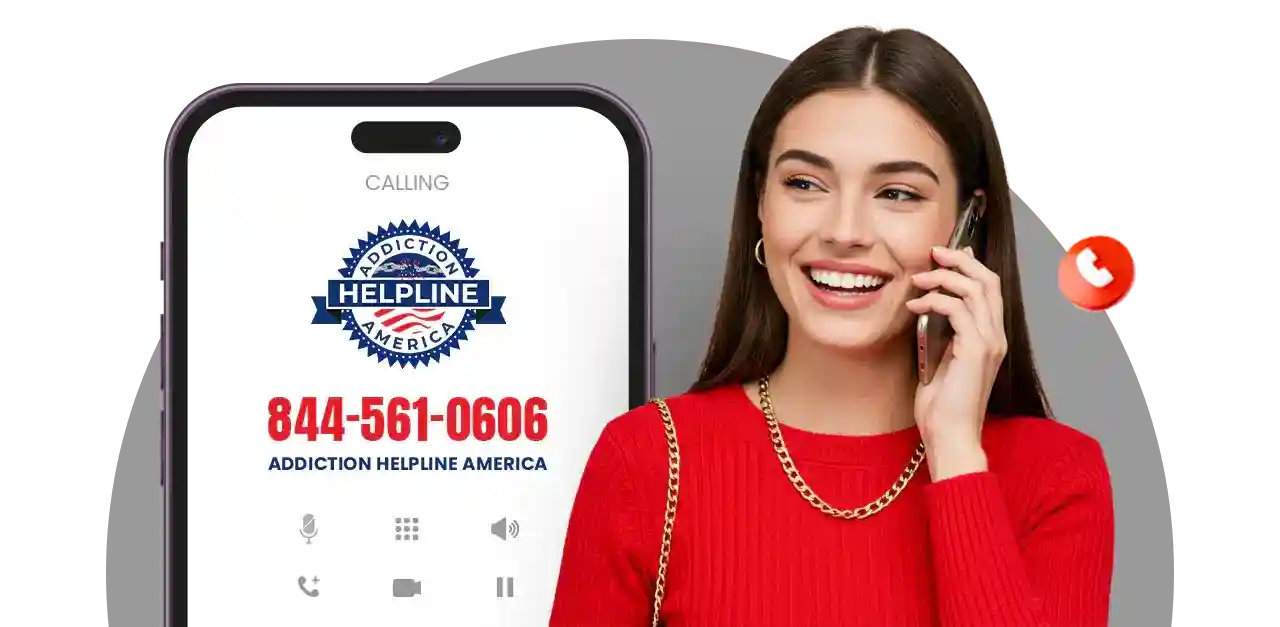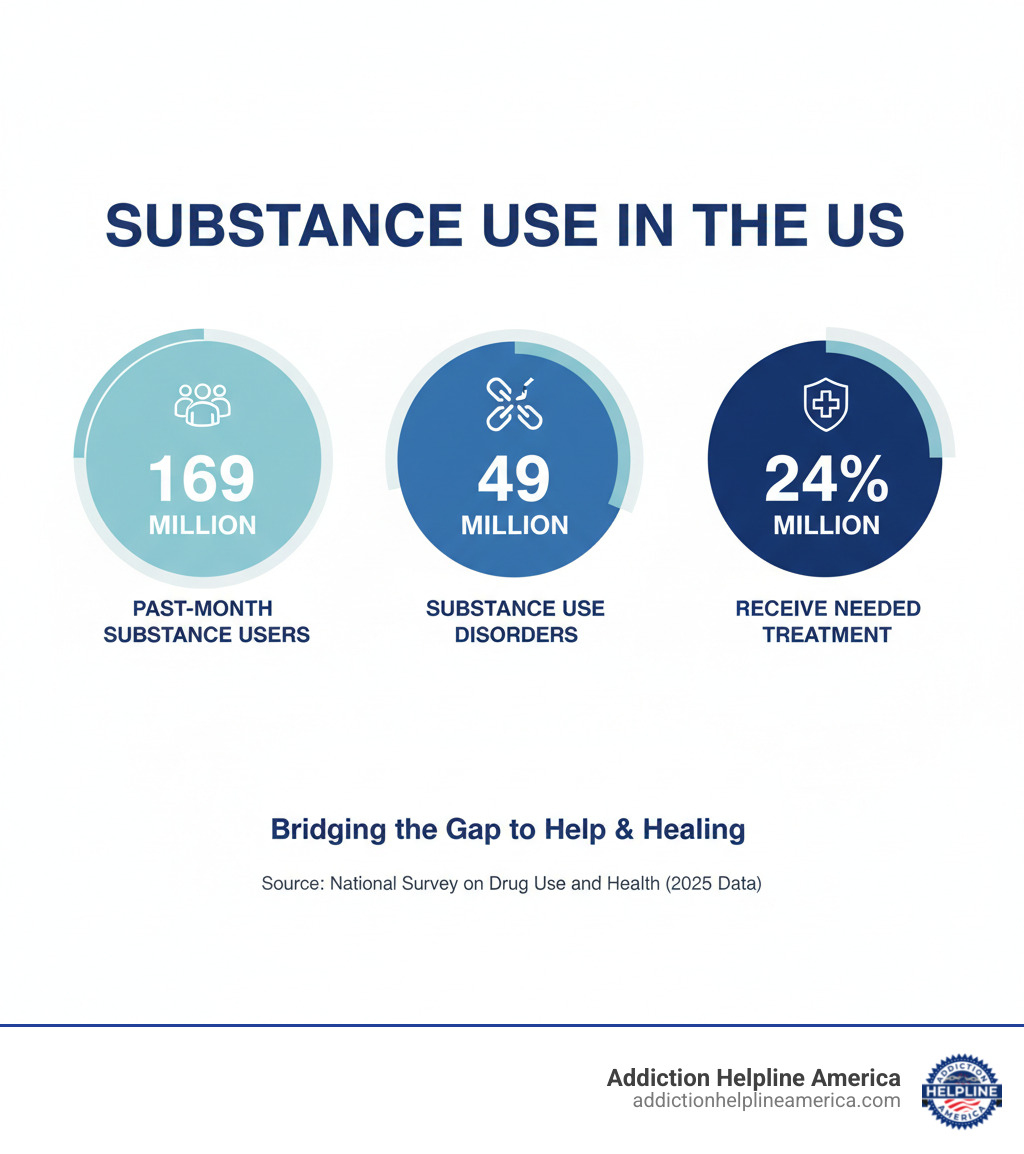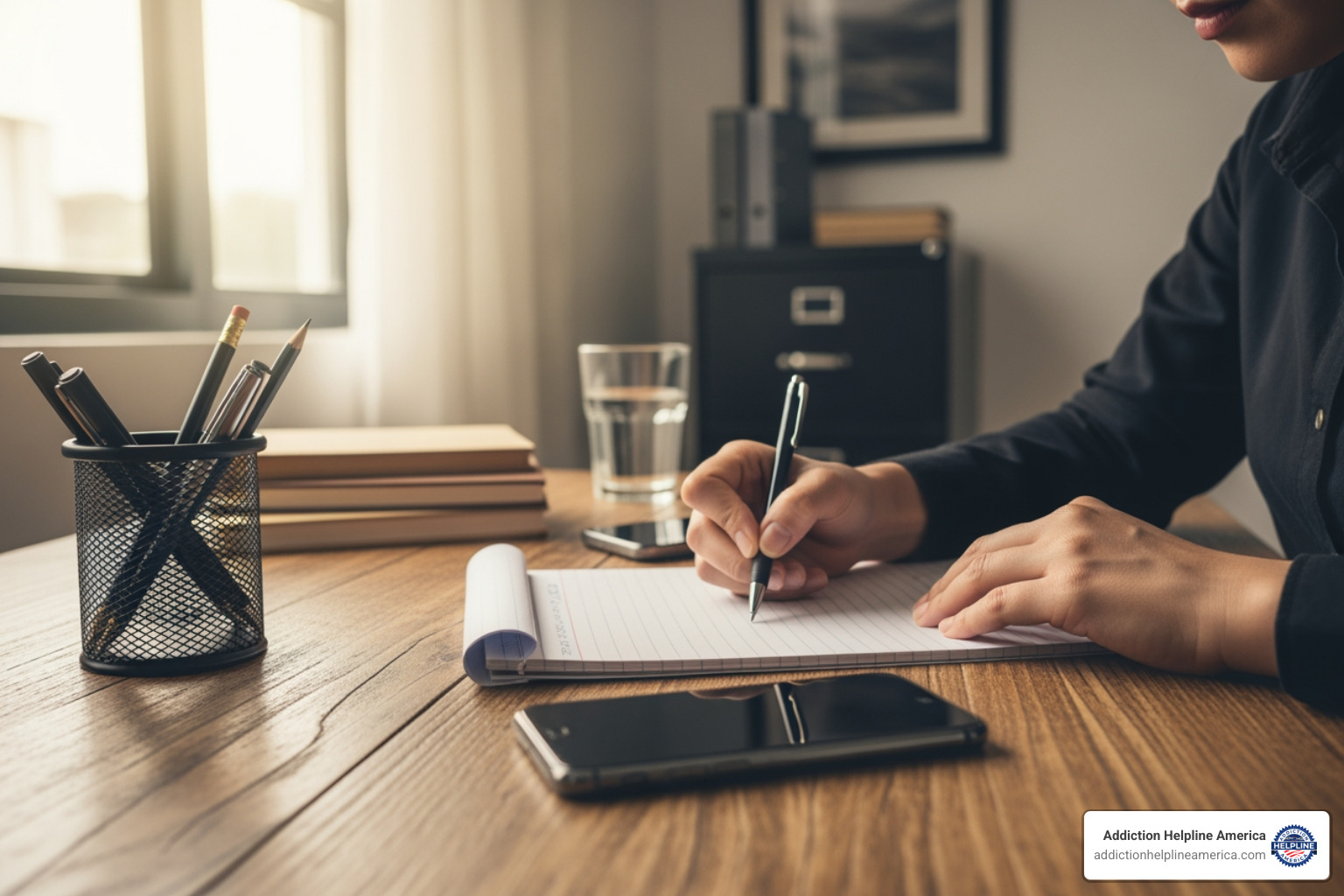
Understanding When to Reach Out for Help
A Free drug helpline provides confidential, 24/7 support for anyone struggling with substance use or concerned about a loved one. These services offer information, emotional support, and treatment referrals at no cost and with no insurance required. They are a judgment-free starting point for anyone affected by addiction.
If you or someone you care about is struggling, you’re not alone. Nearly 49 million people in the United States have a substance use disorder, yet most don’t receive treatment, often because they don’t know where to start. A free drug helpline removes barriers like cost, shame, and confusion.
As one caller shared, “You were a safety net when I felt like I was drowning. You had resources to suggest and knew just what to say.” Breaking through that hesitation can be life-saving.
At Addiction Helpline America, we provide compassionate support through our 24/7 helpline. We connect individuals and families with vital resources, including treatment options and support groups. Our team of specialists helps callers steer the path to recovery with personalized assistance.
Similar topics to Free drug helpline:
5 Signs You or a Loved One Should Call a Helpline
Recognizing an addiction isn’t always easy, as it often develops slowly. However, certain patterns can signal that it’s time to call a free drug helpline. If these signs appear in your life or in a loved one, reaching out for support is a critical step.
If any of these five signs sound familiar, it’s time to get help:
- Loss of control over substance use. You intend to use a small amount but end up using far more than planned. You feel unable to stop even when you want to.
- Negative impacts on daily life. Substance use begins to interfere with your job, relationships, or finances. Responsibilities are neglected as the substance becomes a priority.
- Failed attempts to quit or cut down. You’ve tried to stop on your own multiple times but keep returning to use despite your best efforts. This indicates a need for professional support, not a lack of willpower.
- Developing tolerance and experiencing withdrawal. Tolerance means you need more of the substance to get the same effect. Withdrawal symptoms like anxiety, shakiness, nausea, or flu-like symptoms appear when you try to stop. Some withdrawal can be dangerous, making professional guidance essential. More info on the signs of opioid abuse.
- Hiding use and isolating from others. You start lying about your substance use, avoiding friends and family, and giving up hobbies. This secrecy and isolation make it harder to ask for help.
If even one of these signs resonates, it’s enough reason to call. You don’t need to hit “rock bottom” to deserve support. Reaching out to a free drug helpline is a brave first step toward recovery. The confidential, judgment-free conversation can be the turning point.
What is a Free Drug Helpline and How Does It Work?
A free drug helpline is a confidential, toll-free phone service for anyone facing substance use challenges. Staffed by trained professionals, these helplines offer personalized guidance to help you find the right next steps. Unlike a confusing internet search, a helpline provides clear, custom advice from a real person who understands addiction.
These services are available 24/7, completely free, and require no insurance. At Addiction Helpline America, our team acts as a bridge from feeling stuck to finding hope, connecting you with treatment facilities, counseling, and support networks. For more guidance, see our Best Counseling for Addiction Guide.
What Services Does a Free Drug Helpline Offer?
A free drug helpline provides a full support system, including:
- Information and Education: Learn about addiction, different substances, and the recovery process.
- Emotional Support: Speak with a compassionate advisor in a safe, judgment-free space.
- Treatment Facility Location: Get referrals to inpatient, outpatient, or virtual rehab programs that match your needs.
- Counseling and Support Group Referrals: Connect with therapists and peer groups like AA, NA, or SMART Recovery.
- Insurance and Payment Guidance: Get help verifying benefits and exploring financial options for treatment.
Our goal is to empower you with the knowledge and connections to take meaningful action. Our How to Choose the Right Rehab guide offers more insights.
Is My Call Confidential and Anonymous?
Yes. When you call a free drug helpline, your conversation is completely confidential and anonymous. We follow strict privacy policies, operating with the same respect for privacy found in healthcare settings.
You do not have to give your real name, and there is no obligation to commit to treatment. Our advisors provide judgment-free support in a secure environment. Your privacy is our priority.
Finding the Right Helpline: National, Local, and Specialized Resources
Many types of support are available, from national helplines to local resources. Understanding your options can help you find the right fit for your recovery journey.
National helplines offer 24/7 availability and can connect you with resources anywhere in the country. Local and state-specific resources, like our Ohio Substance Abuse Drug Addiction Hotlines guide, provide targeted information for your community. Our directory of Local Rehab Centers also makes it easy to find help nearby.
National Helplines in the US
National helplines are a front door to recovery, no matter where you live.
At Addiction Helpline America, our 24/7 helpline connects you with addiction and mental health treatment centers across all 50 states. Our team listens to your story and helps you find the right path forward. Our services are free, confidential, and connect you to a vast network of facilities. We can help with treatment options, insurance questions, and referrals to support groups. Contact Addiction Helpline America anytime.
For immediate mental health crises or suicidal thoughts, the 988 Suicide & Crisis Lifeline offers 24/7 support. Call or text 988 to connect with trained crisis counselors.
Veterans facing a crisis can dial 988 and press 1 to reach the Veterans Crisis Line for confidential support from responders who understand military-specific challenges.
Helplines for Specific Substances and Demographics
Specialized support can address the unique challenges of different addictions and populations.
- Substance-Specific Support: Whether you’re struggling with opioids, alcohol, or stimulants, we can connect you with programs that offer targeted treatment, such as medication-assisted treatment (MAT) for opioid addiction or medically supervised detox for alcohol. See our guides on How to Quit Drinking and Stimulant Addiction Treatment.
- Support for Veterans: The Veterans Crisis Line (988, press 1) connects veterans with responders who understand military culture and can link them to VA resources.
- Family and Teen Support: Groups like Al-Anon and Alateen provide support for family and friends of those with alcohol problems.
- Faith-Based Support: If faith is important to you, our Christian Addiction Help Guide can connect you with programs that integrate spiritual and evidence-based care.
Helplines vs. Treatment Locators vs. Support Groups
Understanding the different types of resources helps you use them effectively.
- Free Drug Helplines: Your starting point. A live person provides emotional support, answers questions, and offers personalized referrals to treatment. Addiction Helpline America operates a 24/7 helpline for this purpose.
- Treatment Locators: Self-service databases for finding facilities. Addiction Helpline America’s “Find a Rehab” tool lets you search by location, care type, and payment options.
- Support Groups: Ongoing peer encouragement. Groups like AA, NA, and SMART Recovery offer community and fellowship for long-term recovery. You can find a local support group to get started.
These resources work together. A helpline gets you started, a locator helps you research programs, and a support group provides long-term community.
Preparing for the Call and Taking the Next Steps
Deciding to call a free drug helpline takes courage. A few moments of preparation can make the conversation even more productive.
When you call, a trained advisor will listen without judgment. It’s helpful to have some information ready, such as your general location, the substance involved, and any co-occurring mental health concerns. However, it’s okay if you don’t have all the answers; our team is here to help you figure it out. For more information on treatment, the National Institute on Drug Abuse offers a guide on Treatment Approaches for Drug Addiction.
Common Questions to Ask a Free Drug Helpline
Asking questions is a great way to take control of your recovery. Consider asking about:
- Treatment options for your specific situation (e.g., medical detox, inpatient, outpatient).
- Costs and insurance coverage, including free or low-cost programs. Our Medicaid Alcohol Rehab Complete Guide can be a useful resource.
- How to help a loved one if you are calling on their behalf.
- The effectiveness of treatment and what to expect.
What Are the Next Steps After Calling?
After your call, you’ll have a clearer path forward.
- Receive a Personalized Referral List: Based on your conversation, you’ll get a curated list of treatment centers, counselors, or support groups that fit your needs. This may include referrals to safe, supervised Detox Programs.
- Contact Facilities: You’ll reach out to the recommended programs to learn more and find the best fit.
- Decide on the Level of Care: Choose between intensive Drug Program Inpatient care, flexible outpatient programs, or convenient Virtual Rehab.
- Build Your Support System: Lasting recovery involves community. Reconnect with supportive loved ones and join support groups.
Our free drug helpline is a resource you can return to anytime. We’re here to help you steer each step of your journey.
Frequently Asked Questions about Drug Helplines
Can I call a helpline for a friend or family member?
Yes. A free drug helpline is for anyone affected by addiction, including family and friends. Watching a loved one struggle is painful, and you don’t have to face it alone. When you call, our advisors can help you understand the signs of substance misuse, offer strategies for how to talk to your loved one, and connect you with family support groups like Al-Anon. We can also guide you in finding appropriate treatment options for them.
What if I’m in an immediate crisis or overdose situation?
For any life-threatening emergency, including a suspected overdose, call 911 immediately. A free drug helpline provides support and resources but is not a substitute for emergency medical services. If you witness an overdose (e.g., someone is unresponsive or not breathing normally), call 911. If available, administer naloxone (Narcan).
For a mental health crisis or suicidal thoughts, call or text the 988 Suicide & Crisis Lifeline for 24/7 support.
Once the immediate crisis is stable, a free drug helpline can help with the next steps toward recovery.
Are there international resources available?
Addiction Helpline America is dedicated to serving individuals and families across the United States. Our expertise and network of treatment centers are focused within the U.S. While we cannot make direct referrals to international facilities, our advisors can offer general guidance on how to search for help abroad. We can also provide support and resources for you, even if your loved one is in another country. For anyone in the U.S. needing help, Contact Addiction Helpline America anytime.
Call Our 24/7 Free & Confidential Drug Addiction Helpline
Making the first call to a free drug helpline is a powerful step toward healing. Whether for yourself or a loved one, this act of courage opens the door to real change.
Remember these key truths:
- You are not alone. Millions of people walk the path of recovery, and a community is ready to support you.
- Help is available 24/7. Whenever you are ready to reach out, someone is ready to listen.
- Recovery is possible. With the right support, people find their way back to fulfilling lives.
At Addiction Helpline America, we provide personalized, compassionate guidance to connect you with the right treatment centers and support groups for your unique situation. Our team is here to listen without judgment and help you steer the path forward, whether that involves detox programs, inpatient treatment, or local support groups.
Don’t wait. Reach out today and take the next step together.
Our helpline is 100%
free & confidential
If you or someone you care about is struggling with drug or alcohol addiction, we can help you explore your recovery options. Don’t face this challenge alone—seek support from us.
Programs
Resources
Will my insurance
cover addiction
treatment?
We're ready to help
Find the best
drug or alcohol treatment
center
Are you or a loved one struggling with addiction? Call today to speak to a treatment expert.

















